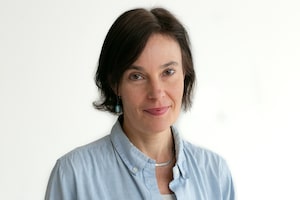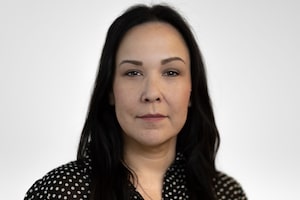
Fred Kelly, right, seen here with his partner Kathryn, is a survivor of a Catholic residential school in Northern Ontario and this week will act as the spiritual adviser for the Assembly of First Nations delegation.Fabrizio Troccoli/The Globe and Mail
Indigenous delegates have landed in Rome, where they will participate this week in historic meetings with Pope Francis about abuses suffered at Canada’s Catholic-run residential schools, and the resulting multi-generational trauma.
Some of the delegates attended mass Sunday evening in a meeting room in the basement of the Best Western Universo in Rome, where most of them are staying. A banner at the head of the room read “Walking Together Toward Healing and Reconciliation.” The service was co-ordinated by the Canadian Conference of Catholic Bishops.
Delegates are preparing for an intense week, during which they intend to share memories of abuse at the schools – and, in some cases, accounts of the deaths of children who attended the institutions.
“I’m very, very aware of how important this opportunity is, to share our stories, as Métis people, with the Pope,” said Cassidy Caron, president of the Métis National Council and leader of the Métis delegation to Rome. Hers will be the first of three groups to meet privately with the Pope.
“The conversations that we’ve been having with the Métis nation, leading up to this point, is how do we move forward, and what is the role for the Catholic Church and for the Pope to play in that healing, reconciliation, truth and justice,” she said. “There is a lot of work to do.”
What Indigenous youth heading to the Vatican for a historic visit want Pope Francis to know
The 32 Métis, Inuit and First Nations delegates will bring differing messages and experiences to this week’s meetings. Many have also brought family, friends and loved ones to support them on their journey. In all, about 180 people have travelled to Rome as part of the wider Indigenous delegation. Also in the city are about half a dozen Canadian bishops and a plethora of news crews. The visit was originally planned for December, but had to be rescheduled owing to health concerns, as the Omicron variant of COVID-19 took hold.
The Métis delegates will meet privately with the Pope at the Vatican on Monday morning, followed by Inuit delegates later in the morning, with each session lasting about an hour. First Nations delegates will meet with the Pope on Thursday, and the entire delegation will have a final audience with him on Friday.
Canada’s residential schools were part of a government-funded, church-run system that aimed to strip Indigenous children of their language and culture. More than 4,000 children died at the institutions, amid abuse, disease, neglect and malnutrition, according to the National Centre for Truth and Reconciliation.
The Truth and Reconciliation Commission described the residential school system as a policy of cultural genocide. The federal government estimates at least 150,000 First Nations, Métis and Inuit children attended roughly 140 of the schools between the 1880s and 1997.
The Canadian Conference of Catholic Bishops, which is covering the costs of the trip, announced the delegation last year after discoveries of hundreds of unmarked graves at former residential school sites led to public outcry.
Many survivors of the schools have said Pope Francis should travel to Canada and apologize for the abuses. The Pope has agreed to come to Canada, though no date has been set. The Vatican has not said whether he will apologize.
Some of this week’s delegates are seeking reparations for harms caused by the church. And some of them have called for further supports in the search for unmarked graves at former residential school sites.
On Tuesday, a group of Indigenous delegates and support staff are expected to visit the Vatican Museums, whose vast collection includes Michelangelo’s Sistine Chapel, as well as many Indigenous artifacts collected by Catholic missionaries and bishops.
Among the collection is a rare sealskin kayak from the Mackenzie River Delta that the Vatican has said was a gift to Pope Pius XI from a Catholic bishop in the Mackenzie area. It was put on display in 1925 at the Vatican, along with some 200 other Indigenous artifacts from Canada.
The kayak has rarely been seen since then. It had been in storage until November, when it was put on display for one day, at The Globe and Mail’s request.
After The Globe published an article about the kayak, Duane Ningaqsiq Smith, chair and chief executive of the Inuvialuit Regional Corp. in Inuvik, NWT, said his organization “is seeking the immediate return” of all Indigenous artifacts held by the Vatican Museums, including the kayak.

‘I’m very, very aware of how important this opportunity is, to share our stories, as Métis people, with the Pope,’ says Cassidy Caron, president of the Métis National Council.Gregorio Borgia/The Associated Press
The Vatican has not commented on the demand, and it is not yet known whether the Inuit Tapiriit Kanatami, the national organization that represents Inuit in Canada, will renew the request this week.
The private meetings with Pope Francis, which will be closed to media, have been heavily planned and will be choreographed to the minute. “We are doing what we can to really elevate the voices of our survivors,” Ms. Caron said.
She added that she hopes the Pope “truly listens, and understands the role that the Catholic Church has played in colonization and the harms done to our communities, and how that still impacts our families today. I hope he understands that. And that he is ultimately accountable.”
Fred Kelly arrived in Rome in time to attend the Sunday mass, accompanied by his partner, Kathryn. He is a survivor of a Catholic residential school in Northern Ontario and an elder in Midewin, a sacred law and medicine society of the Anishinaabe. This week, he will act as the spiritual adviser for the Assembly of First Nations delegation.
He and Kathryn sat near the back of the room listening to the bishops and other Catholics read verses and pray. He did so as well, despite being a victim of sexual, physical and spiritual abuse during his time at residential school.
“I respect all spiritualities and all religions. That’s the way we should be,” he said.
He said he finds no conflict between Anishinaabe ways and Christianity. He had come to Rome, he added, to learn other people’s views.
“I believe that the Creator respects and understands the intention of each religion and spirituality,” he said.
Mr. Kelly will lead a traditional Anishinaabe ceremony in Thursday’s private meeting, where he said he will ask the Pope to join the delegation in prayer for healing and reconciliation.
“I hope that he prays with me,” he said. “And that there be action, not just words. That’s what our people believe. That’s what our people would hope for. That’s what our people expect.”
Our Morning Update and Evening Update newsletters are written by Globe editors, giving you a concise summary of the day’s most important headlines. Sign up today.
 Tavia Grant
Tavia Grant Willow Fiddler
Willow Fiddler Eric Reguly
Eric Reguly